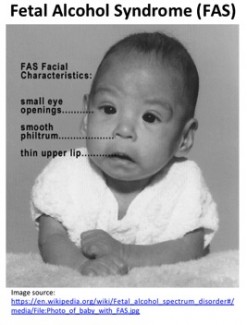Fetal Alcohol Syndrome (FAS), UTC for healthcare professionals

| To read the full text of the in-depth manual of the UTC for healthcare professionals, please visit: https://www.issup.net/node/7376 |
Jacqueline Rouquette (Rouquette, 1957) initially described this syndrome in 1957, during her stay at the Center for Child Hygiene of the Paul Park Foundation, in Paris. FAS is a significant cause of mental retardation worldwide (Evrard, 2010). Affected individuals characteristically show deficient or decreased growth and development, abnormal facial features and anomalies of the central nervous system. FAS is part of the spectrum of the fetal alcohol spectrum disorders (FASD), which are clinical entities caused by exposure to alcohol during the prenatal period. Ethanol is a well know teratogen that can cross both the blood-brain and placental barriers, and also interrupts or alters the embryological or fetal development at any stage of gestation (Jones, 1973). Under the code LD2F.00, the International Classification of Diseases, 11th Revision (ICD-11), describes FAS as a malformation syndrome caused by maternal consumption of alcohol during pregnancy, with the following characteristics: prenatal and/or postnatal growth deficiency (weight and/or height <10th percentile); a unique cluster of minor facial anomalies (short palpebral fissures, flat and smooth philtrum, and thin upper lip) that presents across all ethnic groups, is identifiable at birth, and does not diminish with age. Affected children exhibit severe central nervous system abnormalities including microcephaly, cognitive and behavioral impairment (intellectual disability, a deficit in general cognition, learning and language, executive function, visual-spatial processing, memory, and attention).
References
Rouquette, J. (1957). Influence de la toxicomanie alcoolique parental sur le développement physique & psychique des jeunes enfants. Paris: Faculté de Médecine, Université de Paris.
Evrard, S. (2010). Criterios diagnósticos del síndrome alcohólico fetal y los trastornos del espectro del alcoholismo fetal. Arch Argent Pediatr, 108 (1), 61 – 67.
Jones, K. & Smith, D. (1973). Recognition of the fetal alcohol syndrome in early infancy. Lancet, 2, 999 – 1001.
Related topics
UTC for healthcare professionals
- Substance use during pregnancy: https://www.issup.net/node/8722
- Drug effects: Alcohol: https://www.issup.net/node/9099